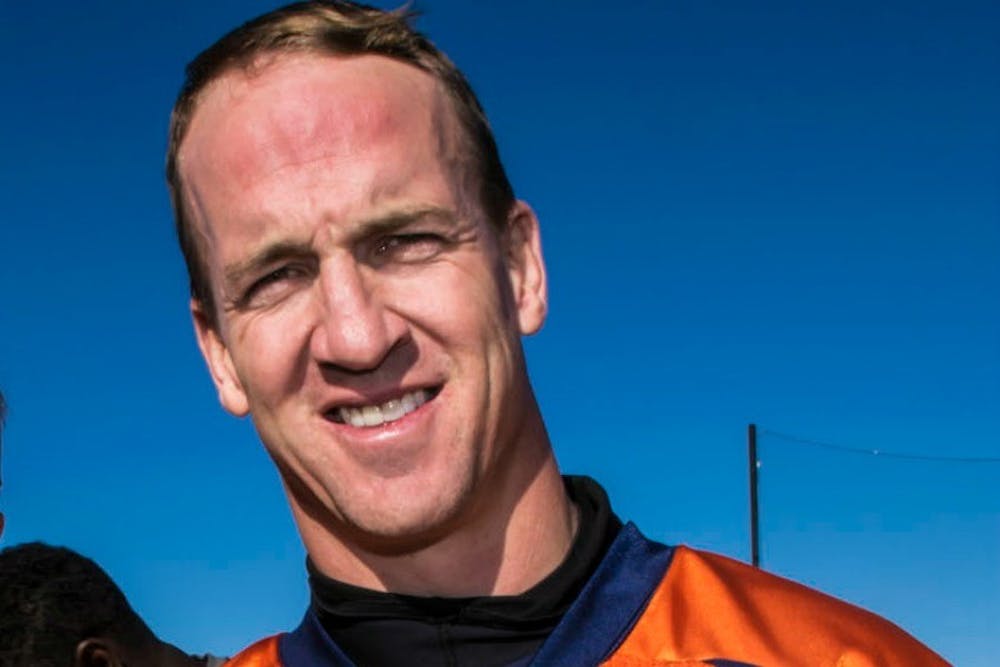By Julia Rivera, For The Miami Student
Once again, a star athlete is involved in a sexual assault case. And again, the athlete's university is accused of hiding the case.
Peyton Manning headlines a lawsuit filed against the University of Tennessee last Tuesday in Nashville. It accuses the university of violating Title IX regulations, creating a "hostile sexual environment" and interfering with the disciplinary process in favor of male athletes.
The lawsuit claims then-starting quarterback of the Volunteers Peyton Manning placed his naked genitals on the face of his athletic trainer, Dr. Jamie Naughright, while she was examining him for an injury in 1996.
Manning has denied the claims and said he was mooning teammate Malcolm Saxon.
Naughright later sued Manning for the incident, and Saxon refuted Manning's statement.
Manning was never the subject of a police investigation, and the lawsuit was settled a year later with the agreement that Naughright would part ways with the school.
Do you think if this incident had occurred with a regular student rather than a student-athlete it would have been handled differently?
Most definitely.
The non-student-athlete would most likely have been subjected to disciplinary hearings and punishment.
Think about how this looks to young male athletes. Time and time again they see men who have committed crimes able to walk away from a situation scot-free.
The suit against Tennessee states Tim Rogers, former vice chancellor for student life, stepped down in 2013 "in protest over the violation of Title IX and the UT administration's and athletic department's deliberate indifference to the clear and present danger of sexual assaults by UT athletes."
Enjoy what you're reading?
Signup for our newsletter
But, Bill Ramsey, the lawyer representing Tennessee, said in a statement the university "acted lawfully and in good faith" in the situations outlined in the complaint.
Do universities realize the psychological damage that incomplete investigations cause?
Sexual assault affects a woman more than just physically. For the rest of the woman's life, she carries the painful memory of being violated. Knowing her abuser is roaming freely instills fear, as he is able to hurt her or someone else.
Do universities realize they protect a wrong-doer who has dramatically changed someone's life?
Universities covering for their student athletes is not a new trend.
In 1974, a woman accused six Notre Dame football players of raping her. Two years later, three men raped a 17-year-old student at nearby St. Mary's University. Two of those three men had been accused in the 1974 case.
Two weeks ago, Florida State University settled the Jameis Winston Title IX lawsuit with former student Erica Kinsman. While Kinsman said the school failed to adequately investigate the rape allegations against her offender, the former FSU quarterback went on to collect the Heisman trophy and the No. 1 overall spot in the 2015 NFL draft. No charges were filed against him.
A former Kent State softball player sued her school and former coach, claiming Kent State covered up a rape by the coach's son.
Why do universities protect these athletes?
Because athletes bring in the money.
Winning leads to money, and universities have to pay for their brand new million-dollar football stadiums. Winning and money afford head coaches the luxury of avoiding comment on the sexual assault allegations surrounding their programs.
Protecting student-athletes over non-student-athletes is horrible. Women are made to feel unsafe and have issues with the ways in which sexual assault cases are handled by their schools.
Making a woman feel less than a man simply because the man is an athlete and makes money for the school is wrong on multiple levels.
Universities must think twice about how they handle sexual assault cases.




